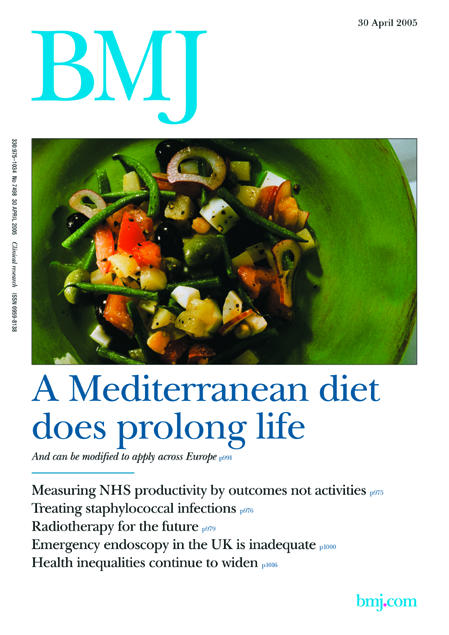Editor—The EPIC-elderly cohort study was designed to investigate the association between a modified Mediterranean diet and longer life expectancy among an elderly subpopulation (older than 60) that is part of the larger EPIC (European Prospective Investigation into Cancer and Nutrition) cohort.1,2
Figure 1.

Focusing the attention on a sample with a more restricted age range seems to reinforce previous findings on diet linked longevity, but important risk factors were not taken into account in collecting the data.
Total cholesterol, low density lipoprotein cholesterol, high density lipoprotein cholesterol, and blood pressure are well known determinants of cardiovascular disease. The study's outcomes are expressed in term of mortality, and cardiovascular disease remains the most important of all causes of death. The benefits of a healthy eating pattern with respect to these variables have been shown.3
The same might not be sustained if the total EPIC cohort were considered (aged 20-85).2 Have the authors considered any possible statistical gain from including these risk factors in the analysis when considering the younger subgroup? We believe that the conclusions for participants older than 60 are stronger if the risk of cardiovascular disease in men and women after the menopause is considered.
In a world in which people eat mainly processed foods that are rich in saturated fats, the analysis is a warning to adopt a healthier dietary pattern and, broadly, lifestyle changes.
Competing interests: None declared.
References
- 1.Trichopoulou A, Orfanos P, Norat T, Bueno-de-Mesquita B, Ocke MC, Peeters PH, et al. Modified Mediterranean diet and survival: EPIC-elderly prospective cohort study. BMJ 2005;330: 991-5. (30 April.) [DOI] [PMC free article] [PubMed] [Google Scholar]
- 2.Slimani N, Kaaks R, Ferrari P, Casagrande C, Clavel-Chapelon F, Lotze G, et al. European prospective investigation into cancer and nutrition (EPIC) calibration study: rationale, design and population characteristics. Public Health Nutr 2002;5: 1125-45. [DOI] [PubMed] [Google Scholar]
- 3.Krauss RM, Eckel RH, Howard B, Appel LJ, Daniels SR, Deckelbaum RJ, et al. AHA dietary guidelines: revision 2000: A statement for healthcare professionals from the Nutrition Committee of the American Heart Association. Circulation 2000;102: 2284-99. [DOI] [PubMed] [Google Scholar]


